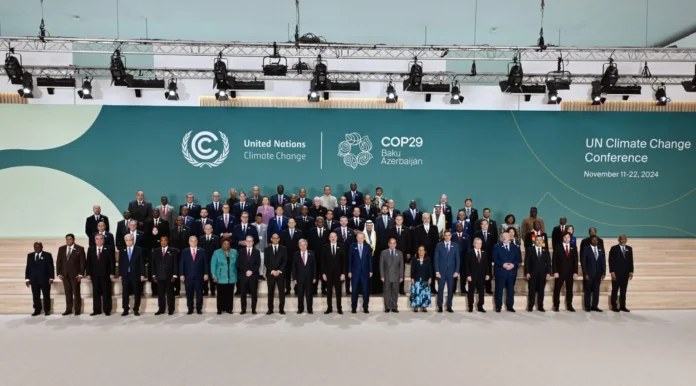BAKU, Nov 14: A new report from the Independent High-Level Expert Group on Climate Finance has called for the mobilization of USD 1 trillion per year by 2030 to assist developing countries in tackling climate change. The report, released on Thursday, highlights the urgent need for both public and private funding to support climate action in these nations, as they face increasing challenges due to global warming.
According to the group of international experts, the necessary funding must come from a wide range of sources, with the report warning that delays in financial mobilization could lead to more significant challenges in the coming years. The experts noted that any shortfall in investments before 2030 would create additional pressure, making it harder and costlier to achieve climate stability in the future. “Failing to invest sufficiently now means we will need to mobilize even larger sums in shorter time frames to catch up on critical targets,” the report stated.
The report emphasizes that global climate action will require between USD 6.3 trillion and USD 6.7 trillion annually by 2030, with USD 2.4 trillion specifically needed for emerging economies. The breakdown for these needs includes USD 1.6 trillion for clean energy, USD 0.25 trillion for climate adaptation, USD 0.25 trillion for loss and damage, USD 0.3 trillion for sustainable agriculture and natural capital, and USD 0.04 trillion for ensuring a just transition.
Co-chaired by Amar Bhattacharya, Vera Songwe, and Nicholas Stern, the Independent High-Level Expert Group has been advising successive COP presidencies since COP26. This report is the group’s third, and it urges the global community to tap into all available funding sources to meet the financial needs of climate action. “External finance from all sources, international public and private, along with others, will need to cover USD 1 trillion per year of the total investment needed by 2030 and around USD 1.3 trillion by 2035,” the authors of the report noted.
The report also stresses that a fourfold increase in total climate finance and a sixfold increase in external finance by 2030 is necessary to keep pace with global climate goals. It calls for developed nations to double or more the amount of bilateral climate finance, which currently stands at USD 43 billion per year, acknowledging its critical role in supporting the most challenging climate needs.
Furthermore, the report urges multilateral development banks (MDBs), including the World Bank, to triple their lending capacity by 2030, as part of the National Climate Finance Goal (NCQG). It is expected that COP29 will result in a new agreement on this goal, outlining the specific annual contributions that developed nations must make starting in 2025 to support climate actions in developing countries.
Developed countries had previously committed to mobilizing USD 100 billion annually to help developing nations address climate change, a pledge made at COP15 in 2009. However, this target was only met in 2022, with loans making up around 70% of the total climate finance provided. Developing countries are now calling for a more ambitious climate finance package, one that is publicly funded, grant-based, concessional, and aligned with their needs, covering not just mitigation but also adaptation and loss and damage caused by climate impacts.
Global South negotiators, including the Like-Minded Developing Countries (LMDC) group, have demanded that developed countries contribute USD 1 trillion per year, while other groups like the Arab Group, the African Group, India, and Pakistan have called for higher amounts, ranging from USD 1.1 trillion to USD 2 trillion annually. In contrast, developed nations propose a broader global investment goal that includes contributions from both government and private sectors, as well as emerging economies like China and some Gulf states.
Developing countries argue that these emerging economies, which have benefited from industrialization, should also take on a significant share of responsibility. They view attempts to include them in the climate finance burden as an unfair shift of responsibility away from the historically major polluters. Many of these nations continue to struggle with poverty and inadequate infrastructure, making their situation more vulnerable to worsening climate impacts, further emphasizing the need for equity in climate finance.
A report by the Independent High-Level Expert Group on Climate Finance calls for mobilizing USD 1 trillion annually by 2030 to help developing nations combat climate change. The group stresses that delays in funding could make climate stability more costly and difficult to achieve


